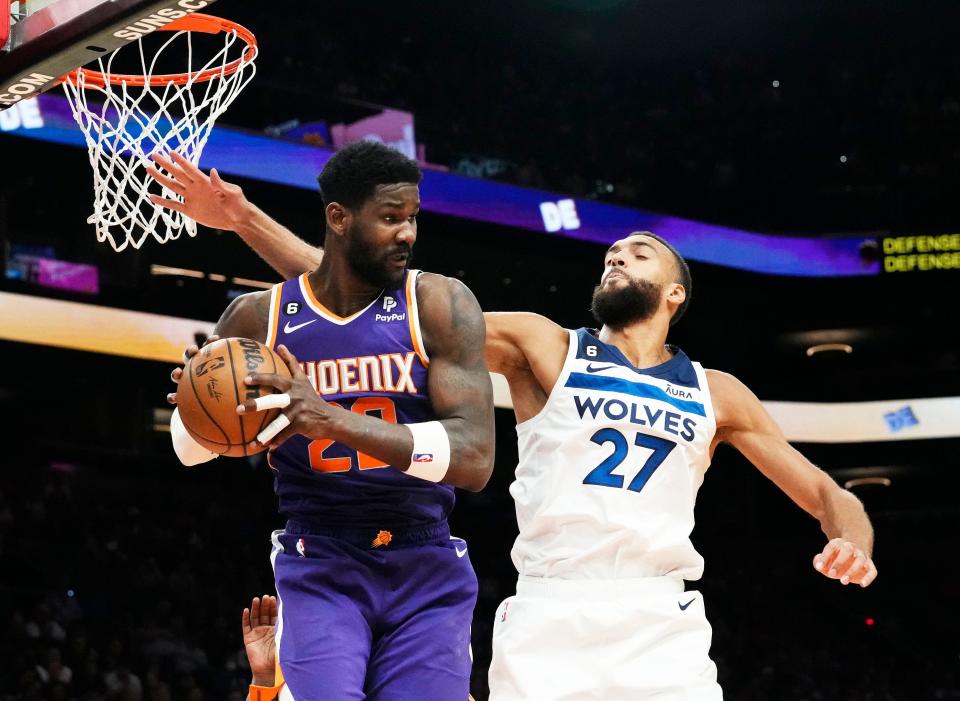Deandre Ayton needs to be more selfish, demand the ball
To help the Suns win a title, Deandre Ayton needs to be more selfish.
Each and every possession, Ayton needs to demand the ball – whenever it comes off the rim. It’s time for Ayton to think of rebounding the way a stray pit bull thinks of the last bone.
It won’t be easy for the affable big fella, but he can do it.
“There are some big guys I work with who are the nicest kids in the world,” mindset guru Reg Butler said. “But if you step on their value system, they’ll tear you to pieces.”
Value of being a beast
Butler, a television analyst for the Motor City Cruise of the NBA G-League, knows all about developing big men. The 6-foot-10 former center has worked with hundreds of players at all levels and says the difference between good and great is more mental than physical.
Take Udonis Haslem, for example.
“He was one of those guys who will almost break your arm to get the ball, because their purpose is to get the ball,” Butler said.
Guys like that are essential for title runs.
Butler doesn’t know Ayton, but he knows basketball and toughness. He played college ball at Xavier before a professional career that included a brief stint with the Atlanta Hawks and a lengthy run overseas, despite not taking the sport seriously until he was halfway through high school. (Also, I saw the guy play an entire football season with a broken wrist.)

These days, Butler runs mental skills clinics for big men around the country.
It’s not as simple as yelling at guys to be more dominant.
“You can’t just make him be a beast, if he doesn’t value being a beast,” Butler said. Instead, you’ve got to figure out what matters most to a player and appeal to that.
For me, that means tapping into Ayton’s work ethic and desire for greatness, both of which were on clear display when he spoke with a TV station in his hometown.
“I can feel the whole world hating me, in a way,” Ayton told Eyewitness News Bahamas. “I’m the guy a lot of people point at. And I see it and feel it.
“But mainly, what I’ve been working on five to six days a week since we’ve lost, is just motivating myself to change the narrative of what people think about me. ... My goal over the summer is to change the narrative. Just unlock whatever it is and just completely just focus on me and changing the whole thing.”
Butler sees an opportunity there. He would advise Ayton to focus more internally on what success looks for himself.
“You can’t control what somebody thinks,” Butler said. “If that’s what you’re focused on, you’ll never feel fulfilled. It’s all right to have some motivation, you should never be satisfied, but you should be fulfilled within your game. How can a player who isn’t fulfilled go out and do his best?”
If Ayton decides that success looks like a snarling, emaciated, cornered and angry junkyard dog, he could become the best rebounder in Suns history; and if he does, he’ll be in position to lead the franchise to its first championship.
It won’t be about the stat of a rebound. It will be about knowing that he demanded the ball every time it came off the rim. The numbers and accolades will simply be a byproduct.
The Suns don’t need more scoring. They’ve got Devin Booker, Kevin Durant and Bradley Beal for that.
The Suns need more stops. Rebounding is the last, and most essential part of any defensive possession. And nobody is better suited for that job than Ayton.
'His entire purpose is to grab the ball'
No Suns player has ever finished a season No. 1 in rebounds per game.
Not Charles Barkley. Not Truck Robinson. Not Alvan Adams. Not Connie Hawkins. Shawn Marion came the closest, finishing third twice in the mid-2000s.
But Ayton has the size and athleticism to do it.
Fans and observers have questioned Ayton’s intangibles since he came into the league, but he still finished ninth in the NBA with 10 boards per game last year, a measly 2.3 rebounds behind league leader Domantas Sabonis.
Imagine if Ayton starts to realize that having an internal drive to be the most aggressive guy on the floor when it comes to demanding the ball off the rim is a mindset that could make him into an All-Star? Even a Hall of Famer?
It’s something that no one else on the team can do.
Devin Booker, Kevin Durant and Brad Beal can score with anyone. They’ve proved it.
Ayton can fill it up, too. His touch is reminiscent of Dirk Nowitzki. Ayton has a feathery fadeaway jumper and range out to the 3-point-line.
But lots of guys have those skills.
What most guys don’t have is his combination of size and athleticism.
We’ve seen flashes from Ayton. He averages 10.4 rebounds per game for his career, and he’s had 47 games with 15 or more boards.
Can he do it every game? Maybe.
For Butler, the best rebounders have the right values, and it goes beyond a desire to collect stats. The statistic of a rebound is secondary to value of being the hungriest guy on the court.
A guy like that, Butler said, “his entire purpose is to grab the ball for his team.”
To reach that kind of goal, a player must be selfish.
Each and every possession, he has to demand the ball — every time it comes off the rim.
He needs to think of rebounding the way a stray pit bull thinks of the last bone.
Reach Moore at gmoore@azcentral.com or 602-444-2236. Follow him on Twitter @SayingMoore.
This article originally appeared on Arizona Republic: Deandre Ayton should be more selfish, become the NBA's best rebounder

